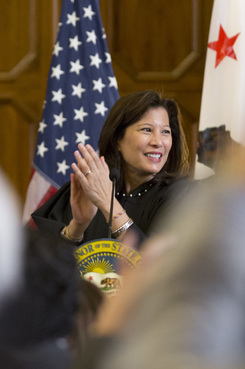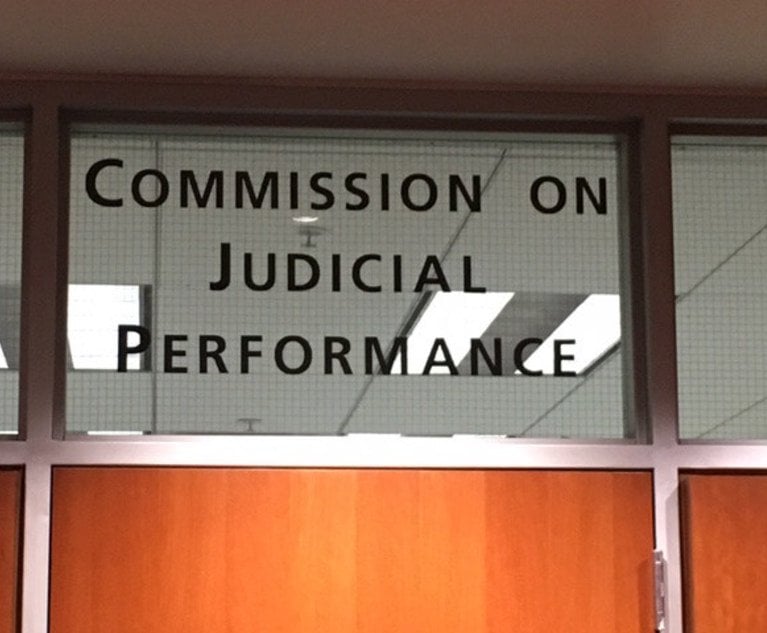Committee Rejects Judges' Push to Limit Settlement Disclosure Rule
The Rules and Projects Committee unanimously agreed to send the amendments to Rule of Court 10.500, the judiciary's open records guidelines, to the full Judicial Council. If the council authorizes the changes at its May 24 meeting, the expanded-access rule would take effect June 1.
May 16, 2018 at 06:44 PM
3 minute read
A Judicial Council committee on Wednesday rejected calls to narrow a proposed court rule that would allow the disclosure of taxpayer-funded settlements involving judges accused of wrongdoing.
The Rules and Projects Committee unanimously agreed to send the amendments to Rule of Court 10.500, the judiciary's open records guidelines, to the full Judicial Council. If the council authorizes the changes at its May 24 meeting, the expanded-access rule would take effect June 1.
The revamped rules are the product of a working group convened in April by Chief Justice Tani Cantil-Sakauye after judiciary lawyers revealed the branch spent $600,000 over the last decade to investigate and settle sexual harassment claims against court workers and judges. The lawyers refused, however, to disclose any details or the names of the accused.
 California Chief Justice Tani Cantil-Sakauye. Credit: Jason Doiy/ ALM
California Chief Justice Tani Cantil-Sakauye. Credit: Jason Doiy/ ALMIn response, Cantil-Sakauye said there should be “no ambiguity” that “the public has a right to know how the judicial branch spends taxpayer funds.”
The working group drafted rule changes that will require financial settlements involving all types of judicial misconduct to be revealed, not just those tied to sexual harassment. The California Judges Association, along with a handful of court executives and judges who submitted comments, said the proposed rule goes too far and should be narrowed to cover only the harassment claims Cantil-Sakauye originally described.
“As worded right now, I just think there is the potential for those people who don't think highly of us to take advantage of this language,” CJA President Stuart Rice told the rules committee. Rice suggested a family law litigant angry with a judge's decision could sue every court officer to try and secure a settlement to publicize his or her claims.
“I don't want us to contribute to those who wish to do us harm by giving them another potential avenue of attack on us,” Rice said.
Justice Marsha Slough of the Fourth District Court of Appeal, who chaired the working group, said narrowing the rule would not be consistent with existing state laws that favor broad disclosure of public spending.
“The reality is, we are public figures, these are public dollars and the public has a right to know,” Slough said.
Read more:
Judges Raise Concerns About Proposal to Open Up Their Settlements
Inside The Recorder's Request for Judicial Workplace Harassment Records
New Rules Would Disclose Judges' Names in Settlement Agreements
Harassment Records Involving California Judges Must Be Public, Chief Justice Says
Judicial Council Paid $500K-Plus to Settle Sexual Harassment Claims
This content has been archived. It is available through our partners, LexisNexis® and Bloomberg Law.
To view this content, please continue to their sites.
Not a Lexis Subscriber?
Subscribe Now
Not a Bloomberg Law Subscriber?
Subscribe Now
NOT FOR REPRINT
© 2025 ALM Global, LLC, All Rights Reserved. Request academic re-use from www.copyright.com. All other uses, submit a request to [email protected]. For more information visit Asset & Logo Licensing.
You Might Like
View All
Advisory Opinion Offers 'Road Map' for Judges Defending Against Campaign Attacks
3 minute read
Sonoma County Judge Disciplined for Diving Too Far Into Local School Debate
5 minute read
'Clear Abuse of Discretion': 9th Circuit Says Judge Should Have Recused From Death Row Inmate's Lawsuit

Judges Say Social Media and Political Polarization Puts Them in Danger
Trending Stories
- 1Family Court 2024 Roundup: Part I
- 2In-House Lawyers Are Focused on Employment and Cybersecurity Disputes, But Looking Out for Conflict Over AI
- 3A Simple 'Trial Lawyer' Goes to the Supreme Court
- 4Clifford Chance Adds Skadden Rainmaker in London
- 5Latham, Kirkland and Paul Weiss Climb UK M&A Rankings
Who Got The Work
J. Brugh Lower of Gibbons has entered an appearance for industrial equipment supplier Devco Corporation in a pending trademark infringement lawsuit. The suit, accusing the defendant of selling knock-off Graco products, was filed Dec. 18 in New Jersey District Court by Rivkin Radler on behalf of Graco Inc. and Graco Minnesota. The case, assigned to U.S. District Judge Zahid N. Quraishi, is 3:24-cv-11294, Graco Inc. et al v. Devco Corporation.
Who Got The Work
Rebecca Maller-Stein and Kent A. Yalowitz of Arnold & Porter Kaye Scholer have entered their appearances for Hanaco Venture Capital and its executives, Lior Prosor and David Frankel, in a pending securities lawsuit. The action, filed on Dec. 24 in New York Southern District Court by Zell, Aron & Co. on behalf of Goldeneye Advisors, accuses the defendants of negligently and fraudulently managing the plaintiff's $1 million investment. The case, assigned to U.S. District Judge Vernon S. Broderick, is 1:24-cv-09918, Goldeneye Advisors, LLC v. Hanaco Venture Capital, Ltd. et al.
Who Got The Work
Attorneys from A&O Shearman has stepped in as defense counsel for Toronto-Dominion Bank and other defendants in a pending securities class action. The suit, filed Dec. 11 in New York Southern District Court by Bleichmar Fonti & Auld, accuses the defendants of concealing the bank's 'pervasive' deficiencies in regards to its compliance with the Bank Secrecy Act and the quality of its anti-money laundering controls. The case, assigned to U.S. District Judge Arun Subramanian, is 1:24-cv-09445, Gonzalez v. The Toronto-Dominion Bank et al.
Who Got The Work
Crown Castle International, a Pennsylvania company providing shared communications infrastructure, has turned to Luke D. Wolf of Gordon Rees Scully Mansukhani to fend off a pending breach-of-contract lawsuit. The court action, filed Nov. 25 in Michigan Eastern District Court by Hooper Hathaway PC on behalf of The Town Residences LLC, accuses Crown Castle of failing to transfer approximately $30,000 in utility payments from T-Mobile in breach of a roof-top lease and assignment agreement. The case, assigned to U.S. District Judge Susan K. Declercq, is 2:24-cv-13131, The Town Residences LLC v. T-Mobile US, Inc. et al.
Who Got The Work
Wilfred P. Coronato and Daniel M. Schwartz of McCarter & English have stepped in as defense counsel to Electrolux Home Products Inc. in a pending product liability lawsuit. The court action, filed Nov. 26 in New York Eastern District Court by Poulos Lopiccolo PC and Nagel Rice LLP on behalf of David Stern, alleges that the defendant's refrigerators’ drawers and shelving repeatedly break and fall apart within months after purchase. The case, assigned to U.S. District Judge Joan M. Azrack, is 2:24-cv-08204, Stern v. Electrolux Home Products, Inc.
Featured Firms
Law Offices of Gary Martin Hays & Associates, P.C.
(470) 294-1674
Law Offices of Mark E. Salomone
(857) 444-6468
Smith & Hassler
(713) 739-1250






